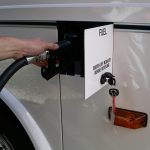Volvo is the latest builder to offer a zero-emission bus to UK buyers in the 7900E. It was launched last week and forms part of the Swedish firm’s Electromobility idea, something that it says will shape cities
Volvo’s vision of an electric future came a step closer last week when it launched the 7900E in right-hand drive form.
Emission-free operation is the main selling point of this opportunity-charged bus, as it will be of the electric double-decker that the manufacturer says is on its roadmap.
But there are several other positives, and the 7900E is just one part of what Volvo views as a step-change for cities: Electromobility.
“Volvo is at the forefront of electromobility, which will solve challenges and take cities forward,” says Nick Page, MD of Volvo Bus in the UK and Ireland.
He adds that, while the 7900E is the first zero-emission Volvo bus in the UK, its technology is proven, having been used in Sweden since 2013.
Low noise levels benefit people living along routes served by electric buses, while zero emissions gives the potential to divert services inside buildings such as shopping centres, generating modal shift.
The bus has a depot charging capacity, and for battery balancing purposes, Volvo advises that it is connected for at least four hours on a weekly basis.
Otherwise, conductive opportunity charging via pantograph-equipped roadside masts handles energy replenishment. Such an encounter lasts for between four and eight minutes, and it gives a range of around 40km.
The complete package
“Volvo’s engagement with electric buses will not just involve vehicle supply,” says Commercial Sales Director Phil Owen. “It will also encompass infrastructure, maintenance, project management and consultancy.”
Like Volvo’s electric hybrid buses – diesel-electric hybrids that utilise opportunity charging to boost their engine-off range – the 7900E uses the OppCharge system.
OppCharge is a common OEM platform. In simple terms, it allows multiple manufacturers’ buses to charge via the same infrastructure. That, says Phil, means that vehicle pricing will be competitive.
But for Volvo, why opportunity charging? Flexibility. When suitable scope for short-duration boosts is built into the schedule, the 7900E can work 24/7. That cannot be said of electric buses that rely solely on depot charging.
Additionally, Volvo says that all of the electric bus projects that it gets involved with – including in Harrogate, where eight 7900Es will enter service with Transdev in 2018 – will use renewable electricity.
Strike a pose
What Volvo’s electromobility concept centres on is changing buses’ perception as part of a definitve urban transport solution.
It describes its approach as being part of a fix for a problem that the industry is partially responsible for creating, and zero-emission buses will have a significant part to play in the cities of tomorrow, says City Mobility Manager Adrian Felton.
“We have to change how cities think, and electromobility can change how they work. The 7900E has endless potential; it gives rise to the possibility of people boarding inside their apartment building and alighting within a shopping centre or a coffee shop.”
Adrian adds that the cost of establishing an opportunity charging infrastructure can be more quickly amortised by using it to power refuse vehicles and urban delivery fleets, particularly at night.
Smart thinking is also present within the 7900E. It comes with zone management, which encompasses three operating protocols: Safety zones, silent zones and zero-emission zones.
The latter may sound a given with an electric bus, but the 7900E has a diesel-fuelled heater. When it enters a geofenced zero-emission zone, the heater stops working until the bus leaves again.
In silent zones, ancillary noises are reduced as much as possible, while in safety zones – which may encompass roads surrounding a school – the bus can be governed to a predetermined maximum speed. All zone management is handled automatically without the driver’s input.
The hardware
Volvo’s full low-floor 7900E demonstrator has four 19kW/h batteries that are charged via roof-mounted apparatus.
The manufacturer says that the roadside mast can be designed to suit individual requirements, and it is suitable for use with both double- and single-deck buses.
When the bus stops beneath it, the driver must apply the handbrake and select neutral. He or she then presses a button, and the bus and the charger communicate via a coded wi-fi signal to allow energy transfer to commence.
Phil explains that there is a reasonable amount of tolerance permitted in the bus’ positioning; it is around a metre in both directions.
The mast comes in 150kW and 300kW versions. The former is suitable for electric hybrid buses, but full electric requires the higher capacity model.
A brief drive of the 7900E shows that it is an attractive vehicle. Acceleration is rapid, although full power is not delivered until a certain speed is exceeded.
Where the bus shines is in the passenger experience. It is exceptionally quiet, indicating that Volvo has already met one of its key objectives for electromobility. It is playing a long game in achieving the others, but with a massive investment already behind it, only the brave would bet against it doing so.

























